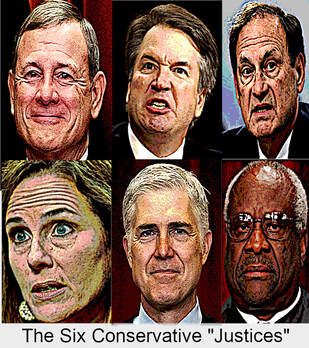
Thus, when judges are confronted with cases involving highly technical or esoteric issues, they usually wing it. And that accounts for a growing body of bad law.
In 1973, when Roe v. Wade, the landmark abortion rights case (since reversed in 2022 by Dobbs v. Jackson Women's Health Organization) was before the Supreme Court, Justice Harry Blackmun, agonizing over writing the majority opinion, took the highly unusual step of going outside the Court, picking the brains of the Mayo Clinic’s top-caliber physicians. Prior to becoming a judge, Blackmun had been the Mayo Clinic’s general counsel, which afforded him special access to its collection of medical experts. Tapping this kind of expertise has been a rarity and is non-existent today.
Today’s Supreme Court, dominated by six right-wing ideologues, sees no need to go to the lengths Blackmun did because they are convinced that they know better than anyone what the country requires. The possibility of doubt rarely enters their minds. A Court steeped in ideology cannot possibly make wisely considered decisions about disputes involving such complex and prodigiously specialized matters as climate change, artificial intelligence, cyber and other STEM issues. These are arenas where knowledge of the law alone is not enough. Amicus (friend of the court) briefs submitted by interested parties who are not litigants help a little, but their content is invariably biased by the sides they take and their special interest in a favorable outcome.
Even were the Court composed of nothing but genuine judicial umpires uncorrupted by political zeal and preconceived notions, it is unlikely that we would witness anything resembling Justice Blackmun’s approach to opinion writing. The current crop of Justices protest too much when they loudly proclaim that they are apolitical arbiters seeking only a just result.
Lack of access to outside experts when deciding complex cases is not just a problem unique to the Supreme Court. It affects all courts, federal, state and municipal. However, it is at the Supreme Court level where expertise is most essential, but most lacking.
Two reforms would go a long way toward closing the Supreme Court’s growing expertise gap: Congress should step in and establish (1) additional specialized federal courts in addition to the current assortment of specialized adjudicative bodies that hear and decide a variety of disputes (bankruptcy, international trade, claims, taxes, veterans’ claims, contracts, patents, trademarks, social security benefits, employment, etc.). New specialized courts could tackle highly complex scientific, technical, medical and other disputes about issues that require special expertise, for example, such as what could be applied by judges who have degrees in both medicine and law. Then, if these cases get to the Supreme Court, the Justices could benefit from the specialized expertise reflected in the record; and (2) a Supreme Court Research Service modeled on CRS, to which the Justices can turn for counsel when confronted with issues beyond their—and their clerks’—ken.
Dick Hermann
June 9, 2023


 RSS Feed
RSS Feed